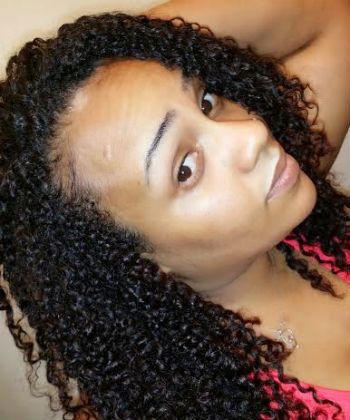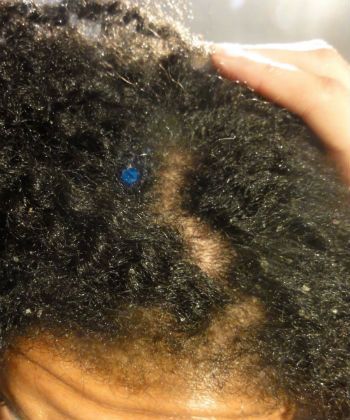If you’re anything like me, growing up you sat between your mom or grandma’s legs, head resting on her knee while you winced and whimpered as she combed, brushed, styled, braided, or pressed your hair. “Tenderheaded” was your middle name as a child, and as an adult, you get a little teary-eyed at the thought of sitting through braids and other styles.
Coping With a Sore Scalp
Even though my years of tenderheaded wincing and ponytails are over, I still get the occasional sore scalp from time to time (which I write more about here on my blog“>. Most of the time, I can attribute it to new growth spurts (awkward, but I know for my hair, that’s what’s happening –this goes all the way back to my middle and high school days”>. Usually, with a little massage (with coconut, olive, jojoba, or any other type of oil”> the soreness goes away within a few hours. But if a scalp massage isn’t solving your sore problems, check out these other 6 culprits that may be to blame:
Too-Tight Styles
Pulling your hair up into a tight bun every day as a protective style? Sure, it may be saving your ends from sudden death, but it may be wreaking havoc on your scalp. Pulling ponytails, braids, and buns too tightly leads to extra stress on the scalp, which can cause scalp soreness, breakage, premature removal of hair from the follicle, and ultimately trauma to the follicles (hello, bald spots”>.
Excessive Manipulation of Hair
Yanking, tugging, pulling, and stretching is excessive. Remember those painful hair sessions we talked about earlier? You weren’t crazy as a kid. The tugging, pulling, and stretching of hair to make it bend to your will can cause soreness in the aftermath. Not to mention, breakage and unnecessary hair loss.
Dirty Scalp
Us natural gals are the queens of using conditioner for everything. By and large, there is nothing wrong with using conditioner to cleanse, condition, and leave-in as a moisturizing base for styling. But every once in a while, we’ve got to clarify ladies! Conditioner, like heavy butters, oils, stylers, and everything else we use, tends to build up on the scalp. This buildup suffocates the follicles, which can lead to soreness and hair loss. Can’t remember the last time you touched shampoo, or used ACV or baking soda? Make your next wash day a clarifying day.
Inflammation or irritation
If you wear your hair loose, clarify regularly, and don’t have any abrasions on your scalp, or any chronic skin conditions, you may have a sensitivity to one or a few of the ingredients in products you use. Check your ingredient labels for artificial dyes, artificial fragrances, drying alcohols, propylene glycol, and other known irritants to the skin. If one of your faves has any of those ingredients, swap it out for another product that is more natural and see how your skin responds.
Chronic Skin Conditions
Conditions like psoriasis, eczema, and seborrheic dermatitis result in dry flakes, scales, and patches on the scalp. As a result, sufferers may experience sore scalp and itchiness as the scales and patches proliferate. Using omega 3-rich oils such as hemp, flaxseed, kukui, and soybean mixed with soothing jojoba, olive, or coconut and an essential oil like tea tree, rosemary, or peppermint to make a scalp massaging blend is perfect for soothing the sore scalp, helping prevent infection (from scratching”>, and lifting dead skin flakes.
Skin Infections
Often times flaky scalps are itchy, and well, we scratch. Sometimes a little too hard, and with our nails. This leads to breaks in the skin, which can then become infected. If your scalp break produces puss, and you have swollen lymph nodes, don’t treat this at home. Seek a medical professional. Scalp infections can (and will”> lead to hair loss at the site of the infection if not treated properly.
Doctor’s Orders
It is important to note that if you are experiencing scalp soreness in accompaniment to any of the below conditions, that you seek medical professional. Those symptoms include:
-
puss
-
swelling
-
rashes
-
hair falling out in clumps
-
redness/feels hot to touch/burning
-
lumps/bumps








